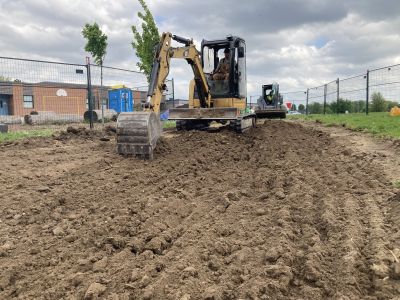Difference between revisions of "Construction: clearing and grubbing"
Jump to navigation
Jump to search
Kyle menken (talk | contribs) m |
|||
| (3 intermediate revisions by 2 users not shown) | |||
| Line 1: | Line 1: | ||
Clearing and grubbing is the stripping of vegetation and topsoil prior to excavation and rough grading within designated areas. | <u>Clearing and grubbing</u> is the stripping of vegetation and topsoil prior to excavation and rough grading within designated areas. | ||
[[File:Scarification.JPG|400px|thumb|right|Scarifying native soils helps to increase infiltration rates. (Photo source: CVC)]] | [[File:Scarification.JPG|400px|thumb|right|Scarifying native soils helps to increase infiltration rates. (Photo source: CVC, 2022)]] | ||
'''Construction steps''' | '''Construction steps''' | ||
#Clear trees, large shrubs, stumps, etc. (grubbing). | #Clear trees, large shrubs, stumps, etc. (grubbing). | ||
| Line 11: | Line 11: | ||
*Contractor cleared and grubbed only within designated areas and according to the phasing plan. | *Contractor cleared and grubbed only within designated areas and according to the phasing plan. | ||
'''Mistakes to avoid''' | '''Mistakes to avoid''' | ||
* | *clearing more area than is needed | ||
* | *insufficient marking of areas to be protected | ||
* | *stockpiling materials without ESC controls or for extended periods of time | ||
* | *leaving heavy equipment in the facility’s footprint | ||
* | *making excessive passes with heavy equipment in the LID practice’s footprint without scouring soil afterward | ||
Latest revision as of 14:57, 22 September 2022
Clearing and grubbing is the stripping of vegetation and topsoil prior to excavation and rough grading within designated areas.
Construction steps
- Clear trees, large shrubs, stumps, etc. (grubbing).
- Use appropriately sized machinery (e.g. a mini-excavator) to strip sod and ground-level vegetation (clearing).
- Stockpile materials within designated areas if necessary. If the materials are being hauled offsite, stripped materials ideally would go straight into the back of a dump truck.
- Secure stockpiles with appropriate erosion and sediment control (ESC) measures if the material must be stored before hauling offsite or will be reused.
Key inspection points
- Structural ESC measures are in place before clearing and grubbing begin.
- Natural heritage features, including trees, and construction limits are clearly marked and respected by the contractor.
- Contractor cleared and grubbed only within designated areas and according to the phasing plan.
Mistakes to avoid
- clearing more area than is needed
- insufficient marking of areas to be protected
- stockpiling materials without ESC controls or for extended periods of time
- leaving heavy equipment in the facility’s footprint
- making excessive passes with heavy equipment in the LID practice’s footprint without scouring soil afterward
